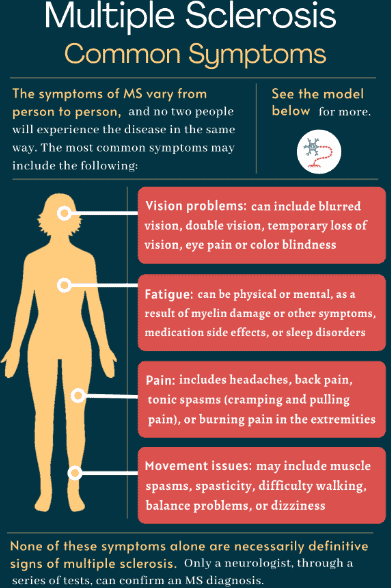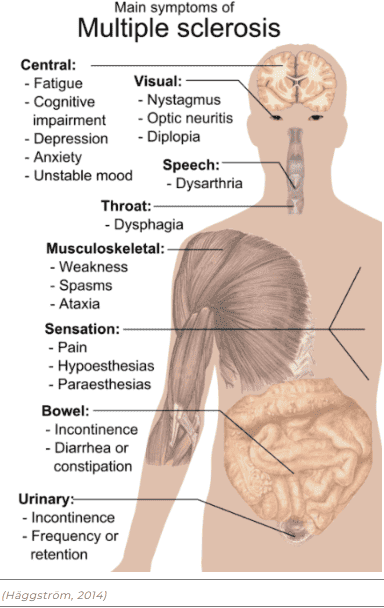Understanding Multiple Sclerosis (MS) and How to Care for Your Loved One: A Guide for Families
Published on November 13, 2023
Updated on June 14, 2024
Published on November 13, 2023
Updated on June 14, 2024

Table of Contents
Receiving a diagnosis of Multiple Sclerosis (MS) can be overwhelming for both the patient and their family. As an experienced hospice nurse with years of experience, I am here to provide you with information and support on what to expect throughout the disease. In this guide, we will discuss the changes your loved one may experience and how you can best care for them from the onset of MS until the end of life.
Multiple Sclerosis is a chronic neurological condition that affects the central nervous system (brain and spinal cord). It occurs when the immune system mistakenly attacks the protective covering of nerve fibers, called myelin, leading to communication problems between the brain and the rest of the body.

Learn as much as you can about MS and its management. Understand the symptoms, treatments, and potential complications to support your loved one better. You can find reliable information from sources such as:
You can also join online forums, webinars, or podcasts to learn from other people who have MS or care for someone with MS.
Encourage open and honest communication about their feelings, fears, and needs with your loved one. Be ready to listen and provide emotional support. You can also:
Ensure that the living space is safe and accessible for your loved one, especially if they have mobility challenges. Consider making modifications, such as installing grab bars and ramps, to make daily activities easier. You can also:
Please keep track of your loved one’s medications and help them stick to the prescribed regimen. You can also:
Support your loved one in maintaining a balanced diet, engaging in regular physical activity suitable for their abilities, and getting enough rest. You can also:
Caring for a loved one with MS can be emotionally challenging. Don’t hesitate to seek support from friends, family, or support groups to cope with the stress. You can also:
As the disease progresses, consider seeking hospice and palliative care services. These specialized care options focus on symptom management, comfort, and emotional support for the patient and the family. You can also:
Remember, every individual’s journey with Multiple Sclerosis is unique. Providing compassionate care, understanding their needs, and seeking support when needed will significantly improve their quality of life throughout the course of the disease.
National Multiple Sclerosis Society
Mayo Clinic Multiple Sclerosis
Cleveland Clinic Multiple Sclerosis
Top 30 FAQs About Hospice: Everything You Need to Know
Understanding Hospice Care: Is it Too Early to Start Hospice?
What’s the process of getting your loved one on hospice service?
Picking a hospice agency to provide hospice services
National Hospice Locator and Medicare Hospice Compare
Between Life and Death: A Gospel-Centered Guide to End-of-Life Medical Care
Providing Comfort During the Last Days of Life with Barbara Karnes RN (YouTube Video)
Preparing the patient, family, and caregivers for a “Good Death.”
Velocity of Changes in Condition as an Indicator of Approaching Death (often helpful to answer how soon? or when?)
The Dying Process and the End of Life
Gone from My Sight: The Dying Experience
The Eleventh Hour: A Caring Guideline for the Hours to Minutes Before Death
By Your Side, A Guide for Caring for the Dying at Home
Articles on Advance Directives
CaringInfo – Caregiver support and much more!
The Hospice Care Plan (guide) and The Hospice Care Plan (video series)
Surviving Caregiving with Dignity, Love, and Kindness
Caregivers.com | Simplifying the Search for In-Home Care
Geri-Gadgets – Washable, sensory tools that calm, focus, and connect—at any age, in any setting
Healing Through Grief and Loss: A Christian Journey of Integration and Recovery
📚 This site uses Amazon Associate links, which means I earn a small commission when you purchase books or products through these links—at no extra cost to you. These earnings help me keep this website running and free from advertisements, so I can continue providing helpful articles and resources at no charge.
💝 If you don’t see anything you need today but still want to support this work, you can buy me a cup of coffee or tea. Every bit of support helps me continue writing and sharing resources for families during difficult times. 💙
VSED Support: What Friends and Family Need to Know
Take Back Your Life: A Caregiver’s Guide to Finding Freedom in the Midst of Overwhelm
The Conscious Caregiver: A Mindful Approach to Caring for Your Loved One Without Losing Yourself
Everything Happens for a Reason: And Other Lies I’ve Loved
Final Gifts: Understanding the Special Awareness, Needs, and Communications of the Dying